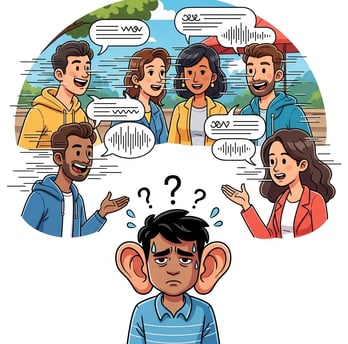5 Simple Tricks to Understand Fast English Speakers!
Do you find fast English hard to understand? Learn 5 easy tricks to train your ears and listen better to native English speakers every day with Elevate English Now.
William Thieroff


Do you ever feel lost when someone speaks English too quickly? Is it hard to follow movies or talks because the words fly by like a fast bird? You are not alone! Many English learners feel this way. It's like a fast river of words that is hard to catch.
You might understand words when you read them. But when people talk fast, it can feel like a big puzzle. Don't worry! This post will share 5 simple, helpful tricks to make listening to fast English much easier. You will learn to understand fast English speakers better, starting today!
Why Fast English Feels So Hard
Why does fast English sound so tricky? Here are some main reasons:
Words Connect Together: Native English speakers often connect words. They don't say each word by itself. For example, they might say "gonna" instead of "going to," or "wanna" instead of "want to." This makes words blend together.
Sounds Get Smaller or Disappear: Sometimes, small sounds or parts of words get very soft or go away. For example, the "and" in "fish and chips" might sound like "fish 'n' chips."
New Everyday Phrases: You might know many words, but native speakers use special everyday phrases that are not always in books. They use them very fast!
Just Too Fast! Sometimes, it's simply the speed. Your brain needs time to hear, think, and understand.
The 5 Simple Tricks to Understand Fast English Speakers
Ready to listen better? Here are 5 easy tricks that truly help:
Trick 1: Don't Try to Understand Every Word (Focus on Key Ideas)
You do not need to catch every single word. Imagine reading a book very fast. You try to get the main idea, right? Do the same with listening! Listen for the most important words. These are often names, actions, or places.
Simple Tip: Listen for words that tell you who, what, where, or when.
Example: If someone says, "I'm gonna grab some lunch at that new cafe," you only need to hear "grab lunch, new cafe." You get the main idea without catching "gonna" or "some."
Trick 2: Listen Often (Even if You Don't Understand Everything)
Your ears need practice, just like your mouth and legs! The more you listen to English, the more your brain gets used to the speed and sounds. It's like training a muscle. Don't worry if you don't get it all at first. Just listen.
Simple Tip: Listen to English every day. You can use short videos, simple podcasts, or English songs. Try for just 10-15 minutes a day.
Example: Watch a short, fun English cartoon or listen to a simple story podcast. Don't pause it often. Just let the sounds wash over you.
Trick 3: Learn Common "Connected Speech" Sounds
Native English speakers often link words together when they talk. This makes the words sound different from how they look on a page. Learning these helps you understand fast speech.
Simple Tip: Pay attention to how words change when they join together.
Examples:
"Did you?" often sounds like "Did-joo?"
"What do you do?" often sounds like "Whaddaya do?"
"Going to" often sounds like "Gonna"
"Want to" often sounds like "Wanna"
Trick 4: Focus on Intonation and Stress (The Music of English)
English has a "music" to it. This means how loud or soft a word is (stress) and how your voice goes up or down (intonation). These can tell you a lot about what a speaker means, even if you miss a few words.
Simple Tip: Notice which words sound stronger (louder) – these are usually the most important words. If a voice goes up at the end, it's often a question. If it goes down, it's a statement.
Example: If someone says, "He WENT home," they want you to know he really did go. If they say, "He went HOME?" they are asking about the place.
Trick 5: Watch with Subtitles First, Then Without
This is a great trick to help your eyes and ears work together. It helps you connect the written words to the fast spoken sounds.
Simple Tip: Watch a short English video (like a simple cartoon, a short interview, or a cooking video) with English subtitles turned on. Then, watch that exact same part again without the subtitles. See how much more you can understand!
Example: Pick a 2-minute scene from your favorite English show. Watch it once with subtitles. Then watch it 2-3 more times without them. You will hear more each time!
Why a Good Teacher Makes Listening Easier
Learning to understand fast English by yourself can be hard work. This is where a good English teacher can make a big difference. They can help you train your ears, teach you common connected sounds, and give you special practice to make fast English clear. A teacher can hear what you are missing and help you catch it.
How Elevate English Now Helps You Listen Better
At Elevate English Now, we know listening well is a big part of real-life conversations. That's why our Everyday Conversation course helps you with this too!
In our friendly classes, you will:
🗣️ Join relaxed talks where you practice listening to a native speaker.
💬 Use guided dialogues to hear how words are used naturally and quickly.
🎧 Work on your intonation and rhythm in the course. This trains your ears to hear these important sounds better.
Ready to stop feeling lost and start understanding fast English speakers like a pro? Imagine joining any conversation with confidence!
Click here to learn more about our 'Everyday Conversation' course and join us today!
We'd love to here from you!
email address
Let's chat
What's app +62 851 7990 5980
Kakao talk id - billthieroff
line id - billthieroff
address
world trade center tower 2
suite 1508 15 floor
jl. jend. surdirman kav. 29 - 31
south jakarta, indonesia
12920
© 2025. All rights reserved.
